2023 Seascape Alaska: Aleutians Exploration 1 (Mapping)
(EX2302)
Exploration Team
Naming every expedition participant in a telepresence-enabled mission is next to impossible! Many researchers from dozens of institutions across the country have provided input into the expedition plan and are expected to participate. However, we've assembled information about the members of the team who are physically onboard NOAA Ship Okeanos Explorer.
And of course, none of this exploration would be possible without the work of the dedicated NOAA Commissioned Officer Corps and civilians who operate NOAA Ship Okeanos Explorer as part of NOAA's fleet managed by NOAA's Office of Marine and Aviation Operations.
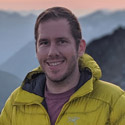
Sam Cuellar
Expedition Coordinator, NOAA Ocean Exploration
Sam Cuellar is a physical scientist with NOAA Ocean Exploration. With a background in underwater archaeology, Sam specializes in mission and survey planning and the collection and interpretation of numerous types of geophysical data from oceanographic systems, including autonomous underwater and remotely operated vehicles and novel one-off technologies. Sam received his B.A. in anthropology and M.A. in nautical archaeology from Texas A&M University, focusing on the development of a low-cost, off-the-shelf infrared imaging system to aid archaeological conservators in better diagnosing the state of recovered artifacts and revealing details invisible to the human eye. He is currently finishing his Ph.D. in nautical archaeology at Texas A&M, exploring the cultural maritime landscape of the abandoned 19th century port city Indianola, Texas, and surrounding Matagorda Bay. Sam’s research fuses newly collected geophysical data with ecological, historical, and archaeological contexts to better understand how various indigenous and European groups were impacted by and morphed the landscape in which they settled. With 11 years of underwater archaeology experience, Sam has had the fortune of investigating an abandoned World War I fleet in a Texas river, excavating a wrecked 17th century Venetian merchantman carrying goods for the Ottoman Sultan in Croatia, and searching for the lost ships of Hernán Cortés along the Gulf Coast of Mexico.
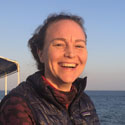
Amanda Bittenger
Mapping Watch Lead
Amanda lives in Portland, Oregon. She began her hydrographic career as a NOAA Corps Officer, and she has been sailing as a member of the Mapping Team on NOAA Ship Okeanos Explorer since 2015. She has 15 years of experience in surveying and mapping with a bachelor’s degree in oceanography and a master’s degree in coastal management with an emphasis on using remote sensing to determine coral reef health. In addition to serving as the mapping watch lead, she has also been the onboard mapping lead for several telepresence mapping expeditions. She has an interest in coastal remote sensing, and she likes to teach explorers-in-training, design t-shirts, and do other creative art projects onboard.
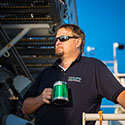
Roland Brian
Video Engineer, Global Foundation for Ocean Exploration
Roland Brian brings 38 years of electronics and satellite experience, with 29 of those years focusing on television and video engineering specialization. Throughout his early years in television, Roland worked to hone his skills and experience for various television stations and remote broadcasters as well as national broadcasters ranging from CBS, PBS, CNN, CNBC, MSNBC, ESPN, Fox Sports, and the Golf Channel. With a keen eye for precise high-quality, high-definition video, he really enjoys and helps bring the imagery to life for the viewers. Roland began his career in the U.S. Air Force where he worked as a satellite communications engineering technician with visions of working on the U.S. Space Station. He traded in that quest for one of deep-ocean exploration and sharing the beautiful imagery with the world. He has worked with NOAA Ocean Exploration since 2010 and plays an integral part in telepresence-enabled remotely operated vehicle (ROV) expeditions. He has also provided engineering design, integration, and operation services for other projects using various Global Foundation for Ocean Exploration (GFOE) and NOAA Ocean Exploration mobile telepresence systems. His duties aboard NOAA Ship Okeanos Explorer include operation and maintenance of the ship's telepresence and video and satellite systems, including those on ROVs Deep Discoverer and Seirios. Again, Roland’s experience embodies the breadth and depth of knowledge that GFOE and NOAA Ocean Exploration encourage. When not at sea, Roland enjoys life with his wife and family in sunny Sarasota, Florida.
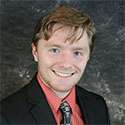
Dana Carris
Explorer-in-Training
Dana Carris earned his bachelor’s degree in environmental resources engineering from the State University of New York College of Environmental Science and Forestry. After working as a water engineer for several years and spending weekends scuba diving on shipwrecks, he attended Texas A&M University where he completed his master’s degree in maritime archaeology and conservation. He has worked on archaeological surveys and excavations throughout the United States and in the Mediterranean Sea and Red Sea. Dana is passionate about 3D documentation of submerged cultural heritage sites and sharing those sites with the greater public. In his free time you can find Dana scuba diving, hiking, or backpacking abroad.
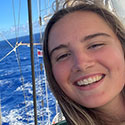
Cassandra (Cassie) Ferrante
Mapping Watchstander, NOAA Ocean Exploration
Cassandra (Cassie) Ferrante is from Annapolis, Maryland. A Colgate University graduate, she holds a bachelor’s degree in the natural sciences with a topical emphasis in marine-freshwater science. She was part of Colgate’s Outdoor Education Program, developing backcountry skills during weekend trips to the Adirondacks. Her love of the ocean led her to join SEA Semester’s Ocean and Climate Program, sailing from Catalina Island, California, to Honolulu, Hawaii. In 2022, she sailed aboard NOAA Ship Okeanos Explorer as a NOAA Ocean Exploration explorer-in-training. Under NASA’s Applied Sciences Capacity Building Program, she completed two terms with NASA DEVELOP in Laramie, Wyoming, and Huntsville, Alabama, utilizing satellite observations of the Earth to address local environmental concerns. Cassie loves exploration of all kinds, which has taken her to pick up backpacking, caving, and scuba diving. Her goal is to combine her passions for sailing, adventure, and science to support offshore schooner research expeditions contributing to the Seabed 2030 Project.
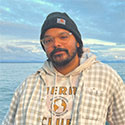
Treyson (Trey) Gillespie
Mapping Watch Lead, NOAA Ocean Exploration
Treyson (Trey) Gillespie lives in Charleston, South Carolina, and holds a bachelor's degree in geology and environmental Geosciences from the College of Charleston (CofC). He is currently pursuing a masters in environmental science and sustainability studies from the same institution. At CofC, Trey participated in the BEnthic Acoustic Mapping & Survey (BEAMS) program where he gained invaluable experience processing and analyzing multibeam bathymetric data. As a result, Trey had the opportunity to work and sail with a variety of international and domestic organizations such as Seabed 2030, Geological Survey Ireland, INFOMAR Project, the U.S. federal government as a NOAA explorer-in-training on several expeditions, and aboard a number of University-National Oceanographic Laboratory System (UNOLS) vessels in support of oceanographic science and as a mentor to undergraduate students. Since 2019, Trey has worked with academic, commercial, and governmental vessels to map our oceans in support of the greater scientific community. Trey serves as a mapping watch lead for NOAA Ocean Exploration and helps to train and mentor new generations of explorers-in-training aboard NOAA Ship Okeanos Explorer.
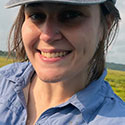
Logan Kline
NOAA Ocean Exploration Knauss Fellow
Logan Kline is a 2023 John A. Knauss marine policy fellow who sits in the science and technology as well as outreach and education divisions of NOAA Ocean Exploration. Her primary role is to support Notice of Funding Opportunity and science communication efforts. Logan holds a Master of Science in ecology and environmental science from the University of Maine and a Bachelor of Science in environmental science and policy from the University of Maryland, College Park. For her graduate work, Logan investigated the efficacy of an artificial intelligence algorithm designed to detect and identify seabirds in plane-based imagery of Maine's coastal islands. She has been involved with NOAA in multiple capacities, including as an Ernest F. Hollings scholar interning at the NOAA Northeast Fisheries Science Center. Logan is very interested in the intersection of emerging technologies and wildlife monitoring; she has experience in remote sensing, geographic information systems (GIS), computer vision, uncrewed aerial vehicles, and passive acoustics with a focus on marine mammal and seabird monitoring.
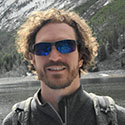
Cameron Kuhle
Explorer-in-Training
Cameron is a lifelong Alaskan and graduate of Alaska Pacific University and the University of Alaska Anchorage with a Master of Science in applied geological sciences. Watching the climate crisis unfold in real time compelled him to act through furthering his education, adding to the global body of carbon flux research, and activism. This work meshes well with his lifestyle of outdoor recreation in a subarctic backyard – skiing, biking, hiking, and stewarding his dog through an exciting life of those activities. His current research projects focus on peatland carbon, but he has field experience from glaciers to rivers to bogs and plans to pursue a doctoral degree in the near future. As an explorer-in-training, Cameron is excited to expand his knowledge and contributions from terrestrial to oceanic.
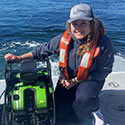
Chrissy Lamendola
Autonomous Underwater Vehicle Operator, Orca Maritime
Chrissy Lamendola is a captain, boat engineer and remotely operated vehicle operator for Orca Maritime. She primarily does benthic (seafloor) survey work off Research Vessel Benthic Cat in San Diego, California. Prior to her work with Orca Maritime, Chrissy spent over nine years working with the Navy Marine Mammal Program. She worked with active-duty dolphins and sea lions trained to protect against enemy swimmers and divers in Bangor, Washington. She transitioned to San Diego where she worked with mine hunting dolphins and then with retired military animals. Her passion for the ocean and the animals in it has driven her towards exploring life below the surface. She is a PADI Dive instructor and received her bachelor’s degree in biology and psychology from the University of San Diego. After graduating, Chrissy completed an extended internship at the School for Field Studies School: Center for Marine Resource Management in the Turks and Caicos Islands. She worked on many research projects: coral bleaching, coral transects, turtle and shark population studies, conch population studies, mangrove habitat studies, lobster casita projects, and many more. When she is not at work, Chrissy enjoys snorkeling, adventures with her dog and baking.
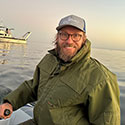
Chad Nelson
Autonomous Underwater Vehicle Operator, Orca Maritime
Chad Nelson is the director of operations and lead autonomous underwater vehicle (AUV) operator at Orca Maritime, an underwater services company based in San Diego, where he has worked for 14 years. With a bachelor’s degree in media communication and a concentration in production, Chad began his career on the water as a diver to record, edit, and deliver video of subsurface infrastructure during inspection. His skillset grew with the company as they expanded to offer side scan sonar and inspection class remotely operated vehicle services, which ultimately led to the acquisition of an AUV. With eight years of experience operating AUVs, sonar data collection and processing remains Chad’s greatest passion at work. When at home he enjoys backpacking the Sierras, gardening, and fishing.
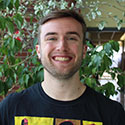
Brett Woodworth
Explorer-in-Training
Brett Woodworth earned his bachelor’s degree in biology with a minor in environmental studies from the State University of New York (SUNY) at Geneseo. At SUNY Geneseo, he conducted three years of undergraduate deep-sea research under the guidance of Dr. Mackenzie Gerringer. He studied the swimming kinematic differences between deep-sea and shallow-water fishes to provide insight on metabolic rate. To investigate this question, he participated in the Friday Harbor Laboratories REU Program, where he found his passion for ocean exploration. In his free time, he enjoys playing basketball, hiking, and conducting genealogy research.

Chris Wright
Data Engineer, Global Foundation for Ocean Exploration
Chris Wright holds a Bachelor of Science in business administration from the University of Mary Washington and a Master of Business Administration from Rollins College. After graduation, he worked as a network and systems engineer in the hospitality industry in the Northeast and Mountain West for more than 15 years. Recently relocating back to the East Coast, Chris joined the Global Foundation for Ocean Exploration (GFOE) data team in early 2019 as one of the newest members of the organization. In 2019, he completed his first expedition aboard NOAA Ship Okeanos Explorer and is extremely excited about continuing the journey to explore the oceans around the world. When he isn't sailing on Okeanos Explorer, he’s busy working in GFOE’s Quonset office planning, designing, and implementing data solutions to help refine and mature its base of operations for ocean exploration. Chris and his family currently reside in Newport, Rhode Island.